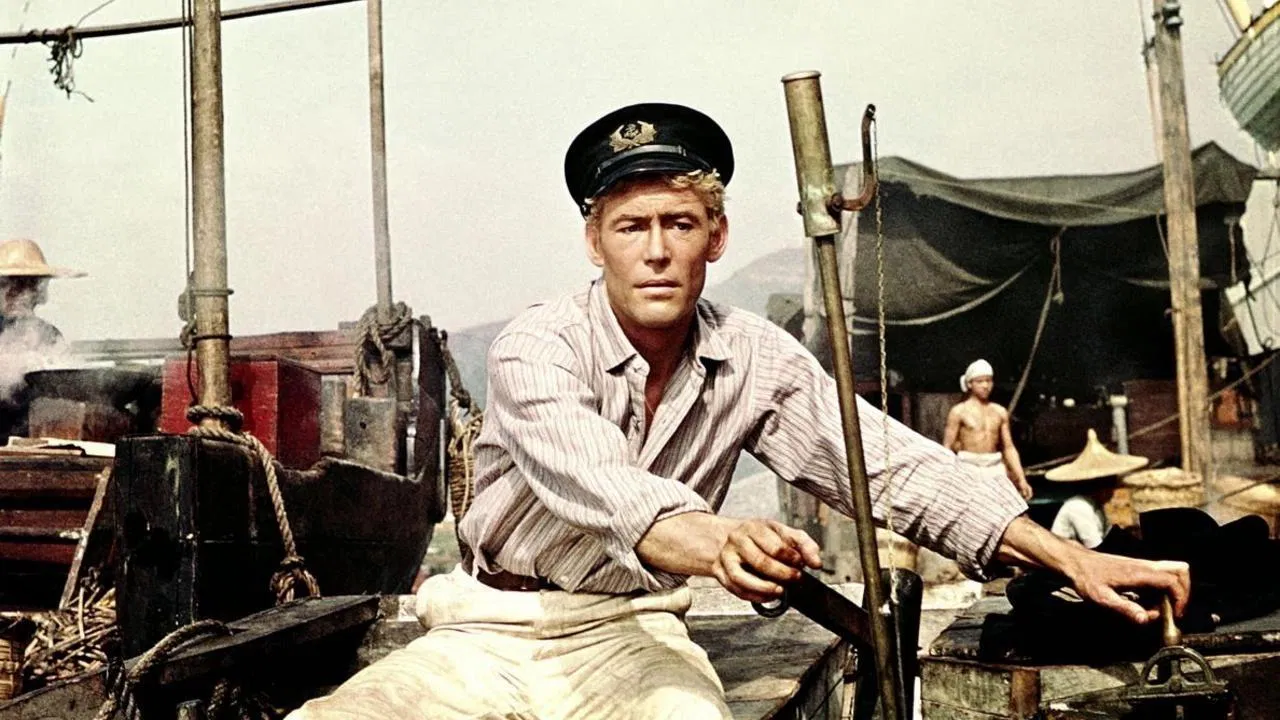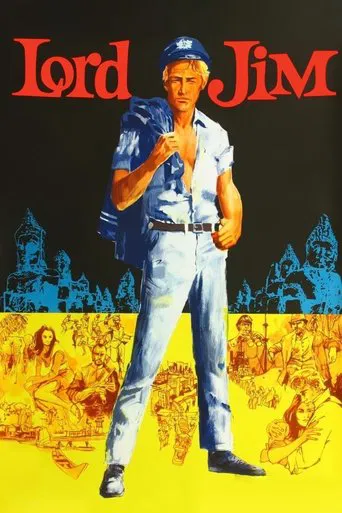

If you love drooling over Peter O'Toole, you'll be very tempted to rent Lord Jim. He plays the title role in a story that holds every promise of being another grand '60s epic, but never delivers. He starts the movie bright-eyed and bushy-tailed, full of integrity and eager to have a glorious career on the sea. Then, in a moment where he faces certain death, he abandons his duty as an officer and leaves the passengers on his ship to drown while he and the other officers slip into a lifeboat. The guilt and shame haunts him the rest of his life, and the rest of the movie. For two more hours, the audience is forced to watch as he needlessly wades through life trying to atone for his cowardice. If you love drooling over Peter O'Toole, just rent Lawrence of Arabia twice.This movie is so slow and boring, I'm surprised anyone stayed awake opening weekend. As gorgeous as Peter is, with his blue eyes sparkling with tears and blond hair curled and luscious, it's not worth enduring this horrible movie just to stare at him. The only type of person who is in the right position to enjoy this movie is a sailor. I'm not trying to be facetious; a sailor is a very specific type of person, one that I will never, ever understand. A sailor prefers to spend years away from their homes, families, friends, and women, out on the ocean, at constant war with the elements, potentially under command of a tyrant, living in cramped quarters. I don't understand a person who prefers that lifestyle than to have regular contact with people, and most importantly, a woman at home who loves him. However, many men are sailors, and those men might like and identify with Lord Jim. And here we have another movie in which James Mason gets second billing and is hardly in the movie! I was so ready to turn Lord Jim off and switch to a more enjoyable film-the bar was very low that evening-but I wanted to wait until James Mason graced the screen. I had to wait an hour and forty-five minutes! By that time, I figured I might as well see the two-and-a-half hour through to its conclusion, as long as I was going to have a lousy evening. Boy, was I sorry. Next time, I'll pop in my favorite Peter O'Toole movie, What's New Pussycat?, for an actually enjoyable evening.
... View MoreI've always liked this movie based on Joseph Conrad's novel.It's a Richard Brooks movie, and what an eclectic body of work the guy produced. He was a storyteller in the vein of John Huston who had been somewhat of a mentor. They were both tough characters. Brooks was tougher. He once sorted Burt Lancaster out after smack talk turned to smacks.Set in the late 19th Century, Jim (Peter O'Toole) is a highly motivated officer in the merchant marine serving on ships around Java and the Far East when he loses his nerve during a storm. Guilt ridden, he disappears into anonymity, but spends the rest of his life looking for a chance to redeem himself. It comes when he helps Malay villagers defeat an army of bandits.There is a great deal of pain and anguish along Jim's road to redemption and Peter O'Toole was the perfect man for pain and anguish.O'Toole's performance was criticised at the time as indulgent and indecisive, but I think he projected a guy struggling with inner demons who forces himself to confront his fears; his hesitancy gave Jim a thoughtful quality. Apparently it didn't appeal to Americans; the film bombed there.The film probes the meaning of courage and some arresting characters test Jim's resolve, especially Eli Wallach as the bandit warlord. Wallach gives an eye-catching performance, as does Israeli actress Daliah Lavi who looks mysterious and hot.You could never go wrong casting James Mason in your movie. That honey-toned voice adds another dimension to his badass, bowler-hatted Gentleman Brown. Curt Jurgens as Cornelius represents European dissipation in the Orient.The film has a measured pace, a literate script and impressive action. Much of it was filmed in Cambodia. Eventually anti-American sentiment at the time forced an early wrap. This is detailed in a terrific biography, "Tough as Nails: The Life and Films of Richard Brooks" by Douglass K. Daniel.At the time "Lord Jim" was made there were a lot of big, star-studded adventure films set in interesting locales: "55 Days at Peking", "Lawrence of Arabia" and "Mutiny on the Bounty" among others. "Jim" got a little lost in the shuffle.Years ago I was delighted to find the "Lord Jim" soundtrack in a second hand record store. Composer Bronislau Kaper gave the film a rich score incorporating South East Asian instruments.It was another element that gave this film a unique quality, which it still has today.
... View MoreBefore Francis Ford Coppola's "Apocalypse Now", there was Richard Brooks' "Lord Jim". Based on a novel by Joseph Conrad, and starring Peter O'Toole, the film's an obvious attempt to replicate the success of David Lean's "Lawrence of Arabia" (also starring O'Toole). The film would prove a huge influence on Coppola's Conradian river journey, as did the underrated "The Sand Pebbles", released one year later.The plot? O'Toole plays Jim, a merchant seaman who becomes first officer on the Patna, a battered tramp liner. After the Patna survives a hurricane, Jim is charged with dereliction of duty. To redeem himself, he agrees to take a shipment of dynamite to a tribe of natives in the fictional country of Patusan (essentially Borneo). It is here where we enter "Apocalypse Now"/"Heart of Darkness" territory, for the native tribe is being ruled by an oppressive warlord, played by Eli Wallach. Many scenes which recall Coppola's film then pop up – boat trips down river, sweltering jungle landscapes, journey's into hell, devilish dictators, brainwashed natives, a hero who must slay the dictator, flotillas of rafts, macabre civilisations in the middle of nowhere etc – but the film's core message is pure "Lawrence of Arabia". Here O'Toole turns his back on Colonialism, renounces Western muscle, steals jewels from Wallach, frees natives and offers himself as a sacrifice. John Huston would do this stuff better with "The Man Who Would be King"."Lord Jim" was shot by cinematographer Freddie Young, who won Academy Awards for his work on three David Lean pictures ("Lawrence of Arabia", "Doctor Zhivago" and "Ryan's Daughter"). Brooks' film offers a few moments of excellent Cambodian and Chinese scenery, but is mostly stiff, flat and drably shot. Brooks can't compete with Lean.6.9/10 – A slow and now-familiar tale, with 2 very good metaphysical discussions in its final act. The film's more politically radical than the thin "Apocalypse Now" (which Jonathan Rosenbaum would call a mixture of "guilty-liberal anticolonialism and protofascist awe"), but much less formally radical than Coppola's picture. See Brooks' "Elmer Gantry" instead.
... View MoreThere were some good things about this movie. The opening half hour or so depicted some very realistic depictions of life at sea, and an exciting ride as the storm hit the Patna, in the last half particularly there are some reasonable depictions of battle and action scenes and throughout there's a potentially interesting character study that's going on. That study revolves around the lead character of Jim (Peter O'Toole) a sailor who finds himself in disgrace after an act of cowardice and then spends the rest of his life trying to redeem himself. Jim was a character with some interesting background and with interesting demons to do battle with. The culmination of his struggle leads to a worthwhile philosophical reflection: "Maybe the difference between heroes and cowards is that they're ordinary men who for a split second do something out of the ordinary." That's not a bad lesson. There's also some good photography in this, and some great scenery.Unfortunately, all the potential gets lost in a story that I felt resembled little more than a long and drawn out muddle. To me it seemed to have a lot of unnecessary filler and it failed completely to hold my attention. By the end, my attention had wandered so often and so far that I really had little idea what was happening on the screen. That could be a critique of my own attention span, I suppose, except that it's unusual for me to lose track of the story even if I don't find it particularly interesting. Personally, I was disappointed in this.
... View More